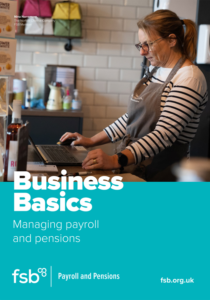
A version of this article was first published in March 2023.
What is the Employment Allowance?
The Employment Allowance lets eligible employers reduce their National Insurance liability by up to £5,000 for the 2024/25 tax year. It’s designed to support smaller employers with their employment costs.
In April 2022, the allowance increased from £4,000 to £5,000 thanks to the Federation of Small Businesses' (FSB) efforts on behalf of its members and remains at £5,000 for the 2024/25 tax year.
“FSB originally put forward the Employment Allowance as a targeted measure to help small firms, and it has now been expanded three times since its creation," said Martin McTague, Federation of Small Businesses National Chair.
This means that you’ll pay less employers’ Class 1 National Insurance each time you run your payroll until the allowance has gone, or the tax year ends, whichever is first. You can still claim the allowance if your liability was less than £5,000 a year.
Employers’ Class 1 National Insurance contributions, rates, and thresholds for the 2024/25 tax year can be found on the government website, including the Health and Social Care levy increase.
Am I eligible to claim?
✔️ You are registered as an employer.
✔️ Sole trader, limited company or partnership that has employees.
✔️ A limited company that employs only directors, where two or more directors earn more than the secondary threshold for Class 1 National Insurance contributions. There is additional guidance from HMRC for single-director companies.
✔️ Employers’ Class 1 National Insurance liabilities were less than £100,000 in the previous tax year.
However, it doesn’t apply to contributions made where IR35 applies, so don’t include off-payroll workers in your calculations, as they don’t count towards the £100,000 threshold.
You can find more information about the eligibility criteria on the government website.
How does it work?
The £5,000 allowance applies to your business, not to individual employees. So, for example, if your NI bill is £5,500 in total for the tax year, you’ll only need to pay the £500 excess.
If you have more than one payroll, you can only claim against one of the payrolls.
The allowance is classed as de minimis state aid if you make or sell goods and services. There’s a limit to how much of this you can get. Check the government website for more information.
How do I claim?
You can claim at any point during the tax year as part of your Real Time Information (RTI) submission to HMRC. You’ll then pay less employer NICs each month until the £5,000 total has been reached. The government has detailed guidance on how and when to make your claim. You can start using your allowance as soon as you submit the claim.
What is an employment payment summary?
Claiming Employment Allowance isn’t an automatic process, so you’ll need to tell HMRC that you qualify and want to claim. An employment payment summary (EPS) is sent to HMRC to apply any reductions on what you’ll owe from your Full Payment Submission, including the Employment Allowance.
Do I only need to tell HMRC once?
No, you need to claim the Employment Allowance every tax year to ensure you’re still eligible. Relief can’t be carried over between tax years.
If your situation changes and you’re no longer eligible for the allowance, you’ll be required to make repayments.
Can I claim for previous years?
Yes, you can backdate claims for the previous four tax years. You'll need an EPS for each year's claim. Check the government website for more details.
More questions about payroll?
At the Federation of Small Businesses, our payroll experts at FSB Payroll and Pensions are here with advice and guidance to help you manage your employees.


